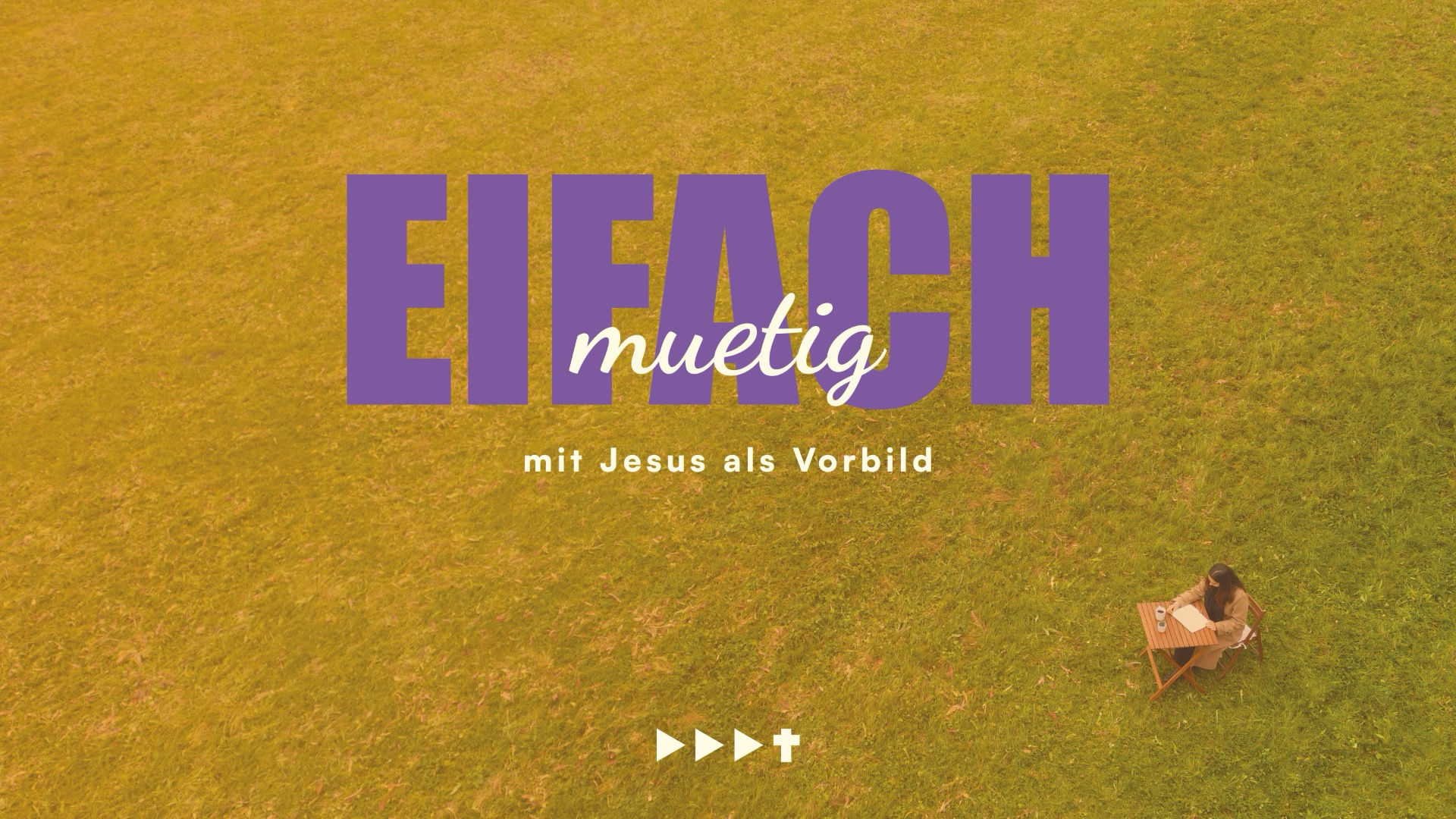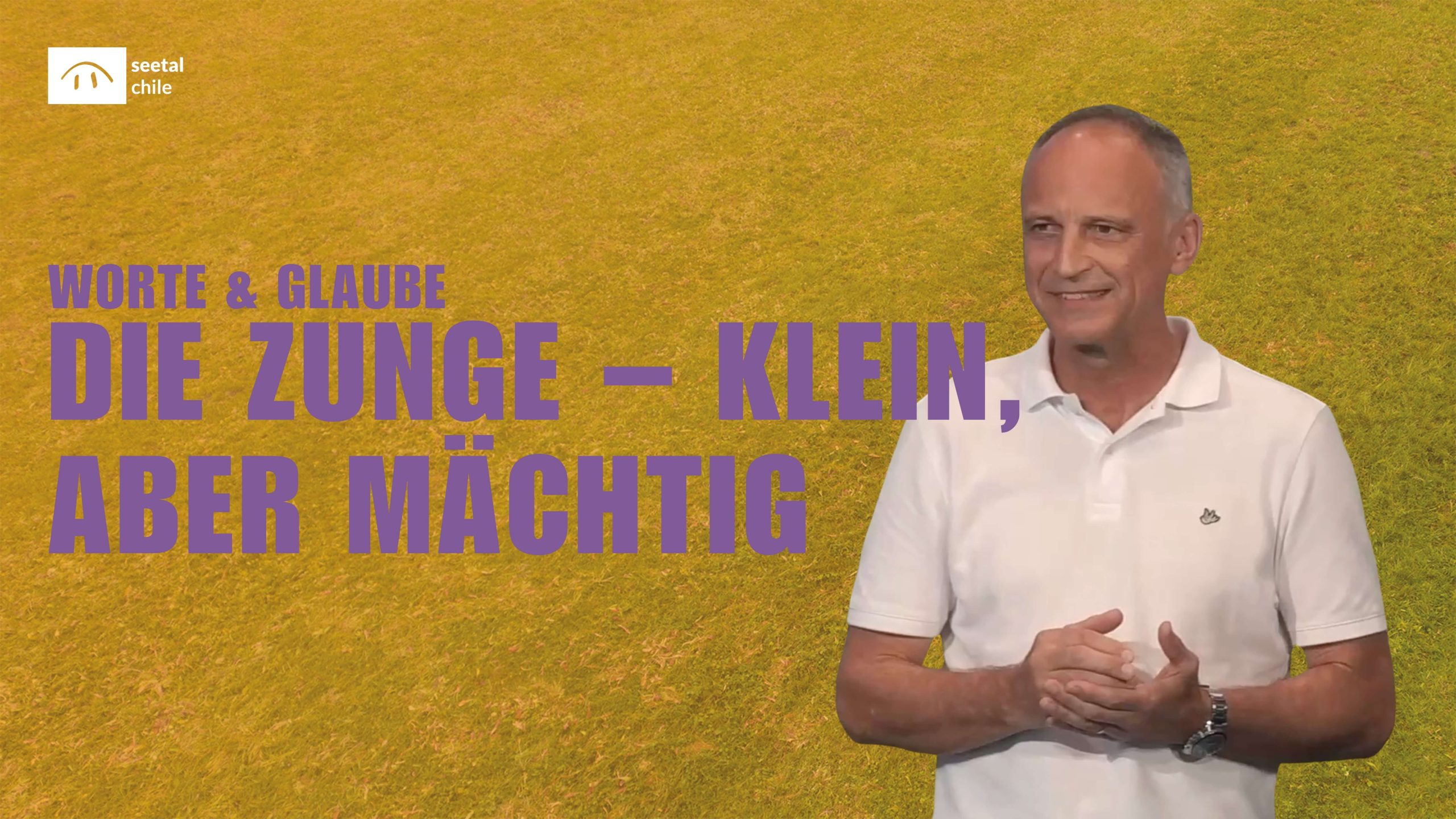Words & Faith | The tongue – small but powerful
Series: EIFACH muetig – with Jesus as a role model | Bible text: James 3:1–12
This sermon invites us to rediscover the power of our words. Words can heal or hurt, bless or destroy – and each of us shapes the lives of others with them. Based on James 3 and impressive examples, it becomes clear that the tongue is difficult to bridle, but God can purify our source. As with the Lusatian Lakes, we need daily «neutralisation» by the Holy Spirit so that our speech encourages, gives hope and brings life.
There is an old saying: «Words are like feathers in the wind – once spoken, they can no longer be collected.» Perhaps you once said something yourself that you immediately regretted. A thoughtless word – perhaps out of anger, fear or frustration – and it hurt someone deeply. Or maybe it was the other way round: a single word from someone else has left its mark on you for years, for better or for worse.
Words are not just air that we mould – they carry power. They can heal or destroy, bless or curse, encourage or discourage. The letter of James speaks very forcefully about the tongue – the organ that forms words – and calls on us to be mindful when speaking.
Words carry weight – especially for teachers
James gives an important tip right at the beginning of his letter: «Dear friends, be quick to listen, but take your time before you speak or get angry» (James 1:19 NLB). Because words are a powerful weapon, we should use them carefully. A mature follower speaks slowly, listens quickly, judges carefully – and places his tongue under the lordship of Jesus.
People who teach others and have a public voice have a special responsibility: «Dear brothers, not so many of you should want to teach in the church, because you know that as teachers we are judged particularly harshly by God!» (James 3:1 NLB). The words of preachers, teachers and pastors shape the thinking of others, they guide, they can build up or lead astray.
James does not conceal the fact that nobody is perfect. Everyone stumbles when speaking. We say things that we later regret. Or we say the right thing, but in the wrong way – too harshly, too late, too loudly: «We all make a lot of mistakes, but if you keep your tongue in check, you can control yourself in other areas too» (James 3:2 NLB). Anyone who could speak without sinning would be a perfect person. Our speech shows how far our transformation into the example of Jesus has already progressed. Maturity is not shown in theological education, but in the ability to bridle the tongue.
That’s why we should be conscious and careful with our words: «Don’t talk too much, because that leads to sin. Be wise and hold back with your words!» (Proverbs 10:19 NLB). It is a good sign when someone learns to scrutinise their speech. Not everything that is true has to be said – and not everything that we could say serves peace.
The tongue – small but dangerous
«The tongue, however small it may be, can cause enormous damage. A tiny spark can set a large forest on fire!» (James 3:5 NLB).
James uses a whole series of impressive images – all with the same message: small things can have great effects.
- A bridle steers a strong horse (v.3).
- A rudder determines the direction of a ship (v.4).
- One spark can destroy an entire forest (v.5).
- A small limb – the tongue – can destroy whole lives (v.6).
Today we could add: A WhatsApp message is enough. A comment under a photo. An anonymous post on social media – and people are exposed, despised, hurt.
James makes it clear: The tongue is not neutral. It is like a spark – it can ignite. Like a poison – it can kill. Like an animal – it can hardly be tamed. Once spoken, words can destroy marriages, friendships, communities and careers.
In this topic, we are all perpetrators and victims at the same time. Words have been spoken about each of us that have had a decisive impact on our lives.
I remember: as a rather shy pupil, I once heard a teacher say: «Do you think you’ve eaten wisdom with spoons?» This ironic sentence was intended to express the fact that I was pretending to be particularly clever without actually being so. It made my face blush – and shaped my self-perception for many years.
What words have you had to listen to that have shaped your life? «Why aren’t you like your brother?» – «You are so lazy / clumsy!» – «Other children can do it, but not you!» – «Pull yourself together!» – «I don’t have time for you!», etc. Such and similar sentences characterise our lives in an unpleasant way and leave deep wounds. But what we are not told also leaves its mark. One example: Granit Xhaka, captain of the Swiss national football team, once said: «My father never praised me. Never. In 32 years, there was no praise for me as a footballer. I tell them: My motivation is that the day will come when he tells me: «You played well today, without exception.» Many people today still go through life trying to prove to their fathers or mothers that they are good and lovable.
We all carry such imprints and injuries with us, and we need God’s help to heal them. Only the living God, our Creator, can heal and restore. The «Living in Freedom» course that we are offering as seetal chile this autumn is precisely about such healing processes. With the help of the Holy Spirit, it is worth scrutinising your own life, bringing unwholesome things to light – and listening to the healing word of Jesus.
Change – not under our own steam
James says clearly: «Humans can tame a wide variety of animals and birds, reptiles and fish, but nobody can hold their tongue. It is an uncontrollable evil, full of deadly poison» (James 3:7–8 NLB). This is a wake-up call: we can’t do it in our own strength – but with God’s help, change can begin.
There is an inconspicuous hint in the text: «And with a tiny rudder the helmsman steers a large ship can go wherever it wants, even in strong winds» (James 3:4 NLB). Behind the small rudder, the tongue, a helmsman steers the ship. Who is the helmsman behind your tongue? So it’s not about making good intentions for our speech or simply keeping quiet more. It’s about the helmsman.
Those who decide to live with Jesus Christ determine who is the helmsman of their lives. The Holy Spirit not only changes our heart, but also our speech. Those who are born again also become new in their speech. It is not just about self-control – it is about a change of heart.
James goes on to write: «We use it to praise God, our Lord and Father; then again we use it to curse other people who are created in the image of God. So blessing and cursing come from the same mouth. And that, my friends, must not be so! Does fresh and bitter water gush from a spring at the same time? Do you pick olives from a fig tree or figs from a vine? No, nor can you draw fresh water from a salty lake» (James 3:9–12 NLB).
The tongue is like a mirror of the soul. What lives inside us comes through our lips. What is impossible in nature happens to us: fresh and bitter water flows from a spring at the same time. The Holy Spirit does not always guide our speech. St Paul describes this inner struggle as follows: «When I want to do good, I don’t do it. And when I try to avoid evil, I still do it» (Romans 7:19 NLB). He locates the problem in human nature, which is always making itself felt.
What options do we have to ensure that more and more fresh water gushes out of our mouths?
Lusatia, north-east of Dresden, was once an open-cast lignite mining region. Now that the open-cast mines have been closed down, the remaining holes are being flooded and renaturalised. The aim is to create the largest chain of artificial lakes in Europe. The area is to be opened to tourists from 2026. However, many of these lakes are highly acidic – with a pH value of less than 3 in some cases. One measure to remedy this is in-lake neutralisation: special boats sail across the lake several times a day and bring in large quantities of lime. At Lake Partwitz, for example, up to 25 tonnes are brought in eleven times a day. Over a long period of time, the lakes thus become pH-neutral – the prerequisite for new life to flourish.
How do we clean our inner «lake» so that life-creating words come out of our mouths? We also need daily in-lake neutralisation. With every conscious encounter with God – be it in prayer, in community or when reading the Bible – our source is changed in the direction of pH 7. This is a lifelong process. But over time, life develops around us, the «tourists» come and are edified, healed and blessed.
On 8 August, the daily lottery read: «I have made up my mind: I will take heed that I sin not with my tongue» (Psalm 39:2 LUT). This is not just a New Year’s resolution, but a daily labour of love. It means consciously letting the helmsman – the Holy Spirit – take the helm again and again. In daily silence, in listening to God, in prayer, lime is added to our source – so that it gives life.
Possible questions for the small groups
Bible text: James 3:1–12
- Personal imprint: Can you remember a word or phrase that has stayed with you – positively or negatively – for a long time?
- Self-reflection: In which situations do you find it most difficult to control your tongue and why?
- Biblical perspective: James compares the tongue to a rudder. What does it mean for you to determine the «helmsman» of your speech?
- Practical application: What «In-Lake Neutralisation» could you incorporate into your everyday life to cleanse and change your speech?
- Give encouragement: When was the last time you visibly gave someone life, joy or hope with your words – and how did the other person react?




